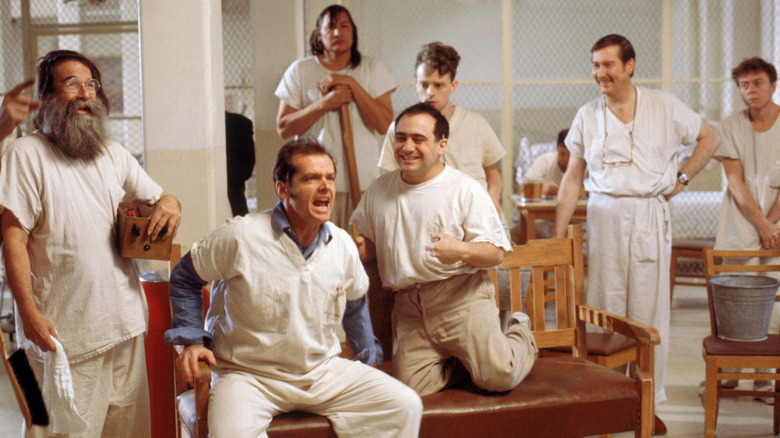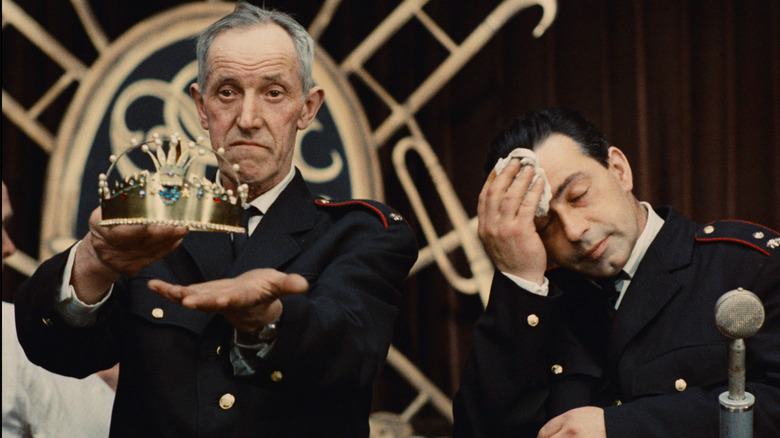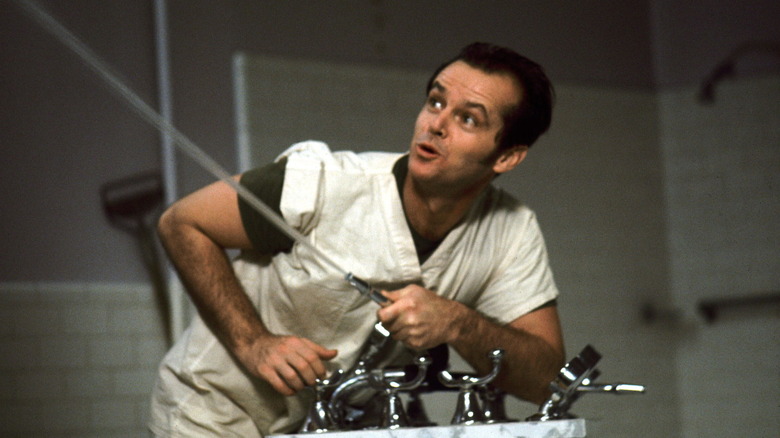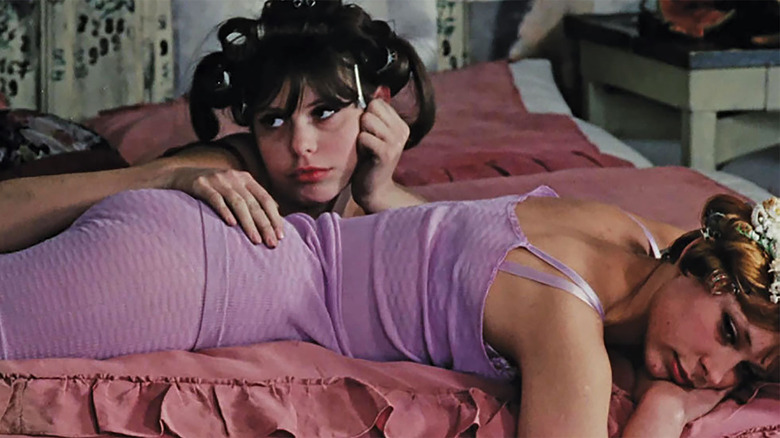One Flew Over The Cuckoo's Nest Was Delayed A Decade Due To Red Tape
Randle Patrick McMurphy may be one of the great counterculture figures in literature and film, but it took a political exile with first-hand knowledge of an oppressive regime to bring the character successfully to the big screen in the Oscar winning "One Flew Over The Cuckoo's Nest."
Milos Forman was one of the bright young stars of the Czechoslovak New Wave when a chance encounter with Kirk Douglas offered him the unlikely prospect of directing an adaptation of Ken Kesey's novel with the Hollywood star in the lead role. In 1962, Douglas bought the rights to the book before it was even published, with an eye on producing a film version with himself in the plum role of McMurphy, the brawling, big-talking newcomer to a psychiatric ward who rouses his fellow patients against the tyrannical head nurse.
Despite Kesey's novel becoming an instant American classic and Douglas being at the peak of his stardom (this was not long after his signature role in Stanley Kubrick's "Spartacus"), no studio wanted to put money into the project. Douglas was dismayed but undeterred, and took the book to the stage instead, playing the lead on Broadway. The play flopped, lasting just three months.
A few years later, Douglas was in Prague as part of a goodwill tour of communist countries. He visited Barrandov studios and saw a few Czech movies, including one by Forman. Impressed by his work, Douglas spoke to Forman at the after party and promised to send him a copy of the book he wanted to make into a film. Would Forman be interested in directing it? Naturally, the young director was thrilled by the prospect, but the book never arrived. Forman told the story after a screening of "Cuckoo's Nest" in 2008:
"For me, it was just another Hollywood bulls*** artist, right? Spins a young Czech filmmaker's head around and then the moment he leaves the room, forgets... Eight years later, the same book comes in an envelope, sent [to] me by producers Saul Zaentz and Michael Douglas, Kirk's son..."
Michael Douglas also wants Forman to direct the same film
After years of unsuccessfully trying to get a film version of "One Flew Over the Cuckoo's Nest" into production, Kirk Douglas passed the reins to his son, Michael, who saw the book as a great "one man against the system" story. His first screenwriter on the project, Lawrence Hauben, introduced him to the work of a Czech director called Milos Forman. As Douglas explained (via The Guardian):
"His 1967 film 'The Firemen's Ball' had the sort of qualities we were looking for: it took place in one enclosed situation, with a plethora of unique characters he had the ability to juggle. At the time, Milos was living in the Chelsea Hotel in New York. He had apparently had a breakdown and never left the building — rumours were he would confide in a Czech friend while lying in bed, and then the friend would go out and see a psychiatrist on his behalf. But he flew to California to see us. Unlike the other directors we saw, who kept their cards close to their chest, he went through the script page by page and told us what he would do."
Forman was a great match for the allegorical source material, having fallen foul of the communist regime's censors and leaving his home country behind after Warsaw Pact troops crushed the brief period of freedom known as the Prague Spring in 1968. As he said (via New York Times):
"To me [Kesey's novel] was not just literature but real life, the life I lived in Czechoslovakia from my birth in 1932 until 1968. The Communist Party was my Nurse Ratched, telling me what I could and could not do; what I was or was not allowed to say; where I was and was not allowed to go; even who I was and was not."
Thanks to strange coincidence, Michael Douglas also sent Kesey's novel to Forman, years after Kirk had promised to send him a copy. The young producer also fancied Forman to direct the film without any knowledge of his dad's previous discussion with the filmmaker in the Czech capital. Forman continues the story, which now includes a whopper of a twist:
"When I met Kirk, he said, 'you son of a gun, I sent you [the] book and you didn't even have the courtesy to tell me to shove it.' And I said, 'you know, I thought the same about you.' Well, what happened, he really did send the book, but the censors at the customs confiscated the book and didn't tell him and didn't tell me."
Communist censors vs the postal project
Forman tells the story of the missing copy of "One Flew Over The Cuckoo's Nest" as an amusing anecdote, yet the strict restrictions of his country's government almost denied him the chance to direct one of the greatest films of all time. The authorities in USSR countries feared "Americanization" and did whatever they could to prevent citizens being influenced by western culture, including books, music, and movies. They basically didn't want cool stuff from the west turning their people's heads and creating unrest.
In Czechoslovakia, communist party member Rudolf Barak told HSTD (General Administration of Press Supervision) employees in the late '50s (via Minulost):
A new responsibility has been added to current tasks of media oversight in the field of domestic press, radio, television, film, literature, fine art, and education. That is the control of all published materials sent to us from foreign capitalist countries... This propaganda campaign is funded and organized by imperialist intelligence agencies of North Atlantic Treaty nations, especially the US. What is the "postal project?" Hostile printed content is sent to individuals... pamphlets, leaflets, magazines, books, brochures, and other promotional material are sent in Czech and Slovak, or foreign languages, promoting various revisionist ideas, Trotskyist views, religion, or exaggeratedly elevating technology, culture, and the science of capitalist states, and above all, the American way of life, the failed "popular capitalism" and the universal defamation of the socialist world.
The HSTD's form of censorship was abolished in 1966 and taken over by the Central Publication Office until 1968, when restrictions were lifted. If Kirk Douglas sent the book to Forman during this time, it would have likely been confiscated under these measures. Kesey's novel has strong anti-authoritarian themes, with parallels in some of the Czech New Wave films of the period. The directors of this movement often used satire or absurdist allegory to critique the regime, with predictably censorious results.
The Czechoslovak New Wave directors and censorship
The Czechoslovak New Wave was a strange period in the country's cinematic history. The film industry was state-owned, but the state had little interest in box office returns. This meant that filmmakers like Forman had an unprecedented level of creative freedom at a time when unrest towards the oppressive government was growing, leading to the ill-fated period of reform known as the Prague Spring.
On the flip side, the censors soon cracked down when they actually saw the content of the films. Forman's first two movies, "Black Peter" and "Loves of a Blonde," steered clear of controversy, but his Czech masterpiece that attracted Michael Douglas' attention, "The Firemen's Ball," was banned after the soviet invasion of '68.
Many of his contemporaries suffered similar treatment. Jiri Menzel, Oscar winner for Best Foreign Language Film with "Closely Watched Trains," also upset the censors with "Larks on a String" — it was openly sarcastic about communism and was banned for the next 30 years. When it was finally released after the Velvet Revolution it won the Golden Bear at the 1990 Berlin Film Festival. Vera Chytilova, whose anarchic comedy "Daisies" is one of only two Czech films to crack the Sight & Sound Top 250, was reduced to directing ads under her husband's name.
On and on down the list, the careers of these outstanding young directors were hampered, curtailed, or outright destroyed by Czechoslovakia's censorious government. Some struggled to find work while others never directed another movie again. Others were threatened with jail. Some outstanding films of the period like "The Cremator" and "All My Good Countrymen" were immediately banned.
Most of the New Wave directors lived long enough to see the fall of communism, and their wonderful films finally received the audience and adoration they deserved. As for Forman, he attributed it to fate that the classic novel eventually found its way to him, from the son of the producer who originally earmarked him for the director's chair. When I marvel at the incredible job he did on "One Flew Over The Cuckoo's Next," I find it hard to disagree; he certainly directs the film like it was his destiny.



